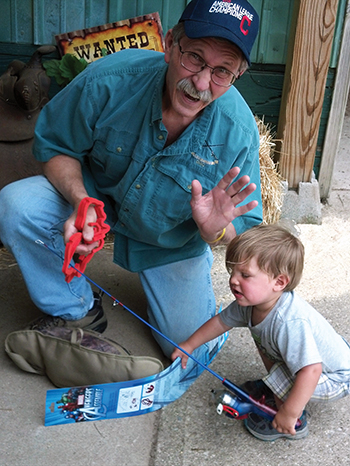Oral Cancer Survivor
Attitude Is Everything
 After overcoming polio at age 8, Hank Deneski was not going to be deterred by inoperable Stage IV squamous cell carcinoma of the tongue. Hank’s determination to survive and his experiences led him to create a support group for others with head and neck cancers in Ohio. Today, he is passionate about helping others get tested as well as finding treatment and support.
After overcoming polio at age 8, Hank Deneski was not going to be deterred by inoperable Stage IV squamous cell carcinoma of the tongue. Hank’s determination to survive and his experiences led him to create a support group for others with head and neck cancers in Ohio. Today, he is passionate about helping others get tested as well as finding treatment and support.
Ohio had a wet spring in 2005, and I developed a cold that I just couldn’t shake. I had trouble swallowing and was short of breath. My doctor gave me an antibiotic but, after I finished it, I had no improvement. I was given a steroid shot and a new antibiotic. When those didn’t work, my doctor sent me to an ear, nose and throat specialist. I saw him in July. He did an oral biopsy and it took him four samples to find cancer. He apologized that it took so many but he was determined to find the cancer, which he eventually did. I was diagnosed with Stage IVB squamous cell carcinoma (SCC) base of tongue (BOT).
A CT scan showed the tumor was attached to the base of my tongue and it was pressing against my windpipe and trachea, which explained why I had difficulty swallowing and breathing. After I received the diagnosis, my wife and I turned to each other and said, “I love you” at the same time. Then I said, “Game on.” I had to face this diagnosis. No crying or being angry would change the situation. What was done was done. I just needed to fight it.
Although many cancers are removed with surgery, mine could not be. Surgery would have involved removing my tongue, esophagus and voice box along with everything from under my nose to my breastplate. Therefore, my doctor scheduled chemotherapy and radiation therapy to be done concurrently.
The next day I had my first visit with a radiation oncologist and, within two days of being diagnosed, I met with my chemotherapy doctor. I also saw a gastroenterologist because, at some point in my treatment, they knew I would need a feeding tube due to the swelling caused by the tumor and radiation and to avoid aspiration.
This wasn’t the first time I’d had health challenges. When I was eight years old, I was diagnosed with polio. The doctors told my parents I needed surgery so they could attach pins to my legs for braces and remove a muscle so that it wouldn’t be damaged by the polio. My father refused because the surgery meant I would never be able to walk again on my own. I proved the doctors wrong, recovered from polio and I’m able to walk today.
The side effects from cancer treatment were difficult. The radiation burned my throat, and I lost my voice. I had already lost 15 pounds, and overall lost 73 pounds. The GI doctor put in a feeding tube two days after I finished my first chemotherapy, and I had it for 18 months. I also had dry mouth and mucositis. My epiglottis froze in position, and a speech pathologist helped me learn to swallow without aspirating.
In 2008, I developed a complication. Over a weekend, I noticed a lump the size of a marble under my tongue. By bedtime, it had grown to the size of a grape. By morning, it was the size of a golf ball. I called my doctor and he said to come in right away. I was diagnosed with Ludwig’s angina, which is a very serious infection that spreads quickly, eventually to the heart sac. It can be fatal, so I had emergency surgery. The dental surgeon removed all of my teeth as well as one-third of my lower jaw, which had osteoradionecrosis — which means my bone had died from the radiation. I had six dental implant posts put in that are connected by a titanium bar to hold an overdenture, and dentures to replace my upper teeth. To speed my recovery, I also received hyperbaric oxygen therapy.
My family, friends and coworkers supported me through everything, but I realized how little support there was for people with head and neck cancers at that time. Looking to find more assistance, I went to the Support for People with Oral and Head and Neck Cancer (SPOHNC) conference in New York in 2006. Later that same year, I attended a LIVESTRONG summit in Texas. I wanted to create more help for people with these cancers because at the time, it was severely lacking.
In August 2007, I created the WesternOhio Oral, Head & Neck Cancer Support Group for patients and caregivers. Awareness and education programs have now been provided since 2009. In 2011, I brought together local businesses, dentists, dental hygienists and oncologists to help bring free oral cancer screenings to the public and to assist those whose screenings came back positive. I also volunteer with Imerman Angels, Fourth Angel and SPOHNC.
To others going through this type of cancer, there is light at the end of the tunnel. Do what your doctors tell you to do, to the letter! Medication adherence is very important. Don’t stop your medications. Use the magic mouthwash. And attitude is everything. I learned from a young age not to let problems get in the way of living life. Challenges provide opportunity for us to grow.


